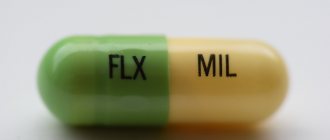Taking any medication is invariably accompanied by negative consequences for the body. For some medications they are pronounced, while for others they are weaker or not felt at all by the patient. We will find out what side effects of the drug Omez occur, how to minimize them, and in which cases therapy should be abandoned.
Omez is an effective remedy for the treatment of stomach diseases associated with high acidity
Omez: concept
Omez is a drug whose action is aimed at reducing the production of hydrochloric acid in the stomach. The main substance is omeprazole. Available in the form of capsules and powder for the preparation of medicinal solution. How does the drug work in the body?
- relieves heartburn;
- reduces the acidity of gastric juice;
- fights the bacterium Helicobacter pylori;
- accelerates the restoration of the gastric wall;
- reduces pain in the epigastric region;
- slows down the process of digesting food.
Omez is prescribed for many diseases of the gastrointestinal tract:
- gastritis;
- ulcerative lesions;
- pancreatitis;
- cholecystitis.
The medication is often used as part of complex therapy for various diseases of the digestive system. Thanks to Omez and the reduction of acidity, damaged tissues in inflamed organs are quickly restored.
When taken, the therapeutic effect occurs within an hour. Capsules are taken whole half an hour before meals. The dosage is selected by a specialist depending on the diagnosis. The drug has a number of contraindications for which use is not permitted:
- age under 18 years;
- pregnancy and lactation;
- intolerance to components;
- allergic reactions to medicine;
- severe kidney and liver failure.
Use in children is possible as prescribed by doctors under strict supervision. When using the drug with other drugs, their interactions must be taken into account. In some cases, it is better to replace Omez with analogues.
If doctors' instructions are not followed and the permissible dosage is exceeded, side effects develop:
- intestinal upset in the form of constipation or diarrhea;
- nausea;
- pain in the epigastric region;
- dry mucous membranes in the oral cavity;
- headache and dizziness;
- weakness;
- increased drowsiness or insomnia;
- depression;
- allergic reactions on the skin.
In rare cases, disruption of hematopoietic processes, dysfunction of the visual organs, and development of joint diseases are possible. Long-term use does not exclude hair loss.
Omez drug: consequences of improper use and help
Often a patient, at the risk of getting poisoned, treats abdominal pain with Omez without consulting a doctor. As a result, side effects and intoxication require action. What to do if you are poisoned with Omez? Read in this article.
What is Omez?
In some cases, complex treatment of poisoning includes taking Omez. There are patients who constantly resort to his help, which threatens with poisoning and other unpleasant effects.
Omez is an Indian generic of omeprazole (a modern secretory drug included in the list of drugs that suppress Helicobacter pylori infection). It is taken for the treatment of gastroesophageal reflux; indications include peptic ulcers and other erosive diseases of the stomach and duodenum.
It is unacceptable to use the drug without consulting a specialist: its uncontrolled use can lead to serious side effects.
Omez: description of the drug
The drug is activated exclusively in the acidic environment of the stomach. According to the mechanism of action, it is a proton pump inhibitor, that is, it inhibits the production of hydrochloric acid in the stomach, simultaneously reducing its activity.
The drug Omez is available in gelatin capsules, each of the two parts of which is marked OMEZ. The contents of the capsules are small white granules.
The concentration of omeprazole (active ingredient) included in the composition is presented in three options: 10, 20, 40 mg.
Another form of release is powder in glass bottles, intended for the preparation of a solution that is injected intravenously.
Omez effect on the body
Omeprazole, the main active ingredient of Omez, begins to work when its required concentration in the body tissues is reached. The acidity decreases after an hour from the moment of administration and, reaching a peak at approximately the 2nd hour, the effect continues throughout the day. On the 5th day of use, the effect is maximum, and after stopping the use of the drug it lasts another 3-4 days.
When ingested, the active substance enters the secretory tubules of the pariental (also parietal, producing hydrochloric acid) cells of the stomach. The chemical composition of the drug is close to benzimidazole, which suppresses the production of enzymes in the stomach that convert complex molecules of incoming food into simpler ones that are absorbed by the body.
Omez counteracts the bacterium Helicobacter pylori, which provokes the development of gastritis and diseases of the upper intestinal tract associated with excessive secretion of gastric juice.
Excretion from the body is carried out through the kidneys and, to a lesser extent, the intestines. Renal failure or advanced age of the patient may cause delayed release of omeprazole by the relevant organs.
Omez during pregnancy
A sharp increase in the risk of cardiovascular pathologies in the fetus has been proven.
Omez can cause the greatest harm during pregnancy in the early stages (the first three months) of intrauterine development, at the time of the formation of vital body systems.
Can I take the medicine in the second and third trimester? Taking Omez during these periods is allowed if it is not possible to choose a safer drug, only under the close supervision of a gynecologist and therapist.
The active substance freely penetrates into breast milk and blood, and is easily transmitted to the baby; therefore, the drug is contraindicated during lactation during breastfeeding. It is unacceptable to treat newborns with the drug without consulting a doctor, who will recommend how to give Omez if necessary.
Omez and alcohol
Alcoholic drinks, as opposed to omeprazole, increase acidity in the stomach, at least neutralizing the drug, but at most aggravating the patient’s situation. Treatment of gastritis involves giving up such pleasures. Drinking alcohol and Omez during pregnancy is completely prohibited.
Strict abstinence is prescribed for patients suffering from liver disease. Suppose the liver is fine, is it then possible, on the occasion of a big holiday, to drink champagne along with the pill? Chemically the medicine is compatible with alcohol.
You should definitely avoid this combination if Omez and alcohol, when used together, lead to the following effects:
- profuse and frequent vomiting,
- prolonged and painful headache,
- apathy, depression, irritability,
- deviations from the usual functioning of the gastrointestinal tract,
- allergic reactions (rash, etc.),
- intoxication occurs faster than usual.
The symptoms may seem familiar to people who have experienced a hangover at least once.
Omez contraindications for use
Basically, Omez has contraindications associated with allergic reactions or intolerance to any of the components of the drug (the composition is prescribed in the instructions). Other cases are described below.
Gastritis caused by low acidity of the stomach, atrophic gastritis is a clear contraindication to the use of the medicine.
If there is a suspicion of oncological diseases of the duodenum or stomach, Omez is able to distort the symptoms, misleading the specialists responsible for the diagnosis.
The tumor may increase due to the action of the drug.
The presence of malignant tumors in the tissues of the stomach requires more serious treatment and surgical intervention; the drug is of no value for patients with problems of this kind.
Diseases associated with a lack of calcium in the body, this point is another contraindication for the use of this medicine: omeprazole removes calcium from the skeleton - an additional reason why Omez is strictly contraindicated during pregnancy . If you are forced to use the drug, you will need to take additional medications to compensate for the lack of calcium, which will be prescribed by a specialist. Omeprazole promotes the proliferation of harmful bacteria - Campylobacter, Salmonella - for this reason, treatment with the drug for gastrointestinal infections is inappropriate. Metabolism of the drug is greatly reduced in the presence of liver failure, causing liver cells to become inflamed. It is forbidden to give Omez to a newborn and children under 4 years of age. Exceptional cases are discussed with the doctor.
Omez - side effects with long-term use
As a rule, Omez quite rarely causes side effects when used correctly , but they are inevitable with long-term - from 2-3 months regularly - or uncontrolled use.
Most often, disruptions in the normal functioning of the digestive system are observed: abdominal pain, bloating, nausea, diarrhea, changes in taste. Dizziness and headaches are less common, and in men, painful erections occur.
Soon after stopping the course of treatment, symptoms disappear without additional intervention.
Long-term and uncontrolled use of the drug can cause the occurrence of pathological formations (cysts) in the stomach area and increase the production of potential carcinogens against the background of intestinal infections caused by a decrease in acidity.
Regular use can cause the development of subacute myopathy, fulminant liver failure, gynecomastia, hemolytic anemia, and peripheral neuropathy.
Omez overdose
The main symptoms of overdose are outlined below.
- Drowsiness. At the same time, it is categorically unacceptable to allow the poisoned person to fall asleep: this is fraught with death.
- Inability to concentrate and answer simple questions.
- Increased sweating, nausea and even vomiting - the body tries to independently reject the poison.
- The oral cavity is dry.
- Dryness is felt in the mucous membranes.
- Blurred vision, darkness in the eyes.
- Strong headache.
- Heart rhythm disturbance.
Help with overdose
If you have these symptoms, you should call an ambulance. Before the doctors arrive, the patient is given 1-2 glasses of clean water to drink, after which he should induce gastric emptying, take a sorbent, drink warm tea with sugar (do not confuse the sequence).
After the examination, the specialist will prescribe the necessary therapy.
There are no special antidotes for Omez, so the treatment strategy will be focused primarily on eliminating the symptoms of poisoning and maintaining the microflora of the gastrointestinal tract; Bifiform and other probiotics can be given.
Consequences after poisoning
The lethal dose of Omez has not been determined, given the composition, it is impossible to die from it, however, if the above-described signs of an overdose appear, the patient should be kept awake and be sure to call an ambulance, make sure that the victim drinks a sufficient amount of water.
How to take medications correctly so as not to harm your body?
Loading…
Source: https://dlja-pohudenija.ru/otravlenie/preparat-omez-posledstviya-nepravilnogo-primeneniya-i-pomoshh
Mechanism of poisoning
Poisoning is a pathological process in which the functioning of internal organs is disrupted. The causes of intoxication can be various factors:
- bad food;
- medicines;
- chemical compounds;
- industrial toxins;
- alcoholic drinks, drugs.
Once in the body, toxins spread throughout all systems. In this case, metabolic processes and the functionality of internal organs are disrupted. Lack of treatment leads to serious consequences.
Consequences
The medicine is not a highly toxic drug, so the consequences of an overdose with this drug may not occur. However, this is only provided that timely assistance is provided to the poisoned person. Otherwise, as well as when taking a very large dose of the drug, the consequences may be disturbances in the functioning of the heart, a decrease or increase in blood pressure levels, pathological phenomena from the central nervous system - dizziness, headaches, etc. In addition, the consequence of an overdose is often a variety of functional disorders of the digestive processes in the form of stool disorders, abdominal pain, etc.
In children, the consequences of an overdose of Omeprazole occur extremely rarely, since most parents store medications in places inaccessible to them. If this happens, then children endure such conditions more severely than adults, but the child’s body recovers much faster.
Is it possible to drink omez if poisoned?
Is it possible to drink Omez if you are poisoned? The drug can be used if it is not possible to carry out therapeutic measures immediately. The tablets will help slow down the absorption of the toxin into the blood . However, Omez is unable to completely stop the intoxication process.
If the overdose is mild, then treatment at home is allowed. In case of serious poisoning, the assistance of medical workers is required, and hospitalization of the victim is not excluded.
It is advisable to use Omez in case of poisoning if the cause is poor-quality food or alcoholic drinks. In case of intoxication with chemicals or medications, the drug will not help.
The decision to take Omez in case of overdose is made by the affected person or the doctor. Taking the drug will speed up the process of restoration of damaged mucous membranes of the stomach and other digestive organs.
How the product works: description
Omez is a complex action medicine. Within half an hour after taking the tablet, belching and abdominal pain disappear. Stomach functions improve, which helps stop diarrhea. After taking Omez, the mucous membrane of the esophagus and intestines is restored, and the inflammatory process begins to be eliminated.
The drug Omez is an effective proton pump inhibitor. Its action is to reduce the acidity of gastric juice. As a result, epigastric pain decreases and the tone of the anal canal increases. Diarrhea disappears, and feces are formed normally. Health stabilizes and diarrhea goes away.
The active ingredient is omeprazole. The main indications for use are:
- erosions and ulcerative esophagitis;
- ulcerative formations in the stomach;
- gastritis;
- diarrhea caused by Helicobacter.
Diarrhea should be treated with Omez if it is caused by an infection. If the cause of diarrhea is not bacterial, Omez will not have the desired therapeutic effect.
Omeprazole for poisoning
For food intoxication in adults, the drug is prescribed 1-2 tablets per day. It is better to take the medicine in the morning on an empty stomach. The maximum dose is 40 mg once, 80 mg per day is acceptable. The duration of therapy is determined by the medical professional depending on the patient’s condition. Omez for alcohol poisoning is taken in a similar way.
If the patient has nausea, it is recommended to postpone taking the medication until the exact cause of the unpleasant symptom is determined. If there is vomiting, the drug should not be used.
Omez can be taken for diarrhea if it is caused by gastritis and other diseases for the treatment of which gastroprotective agents are prescribed. The medication is taken 1-2 capsules per day. The use of the medicine normalizes the digestive process.
In case of poisoning, Omez is given to children only after a specialist has prescribed it; it is prohibited to use the medicine on your own.
Contraindications
The medication is not used:
- during pregnancy and breastfeeding;
- in the presence of individual intolerance to the components, including the gelatin shell of the capsules.
Use in pediatric practice is permissible only on the recommendation of the attending physician. Age restrictions vary among different drug manufacturers. Some pharmaceutical companies allow the drug to be taken from 5 years of age, others - from 12 years.
Patients with severe liver dysfunction are prescribed no more than 20 mg of the drug per day.
Before starting treatment, you should make sure that the diagnosis is correct: sometimes digestive disorders are a sign of serious systemic disorders. The use of an antidiarrheal drug in this case will blur the symptoms and complicate future diagnosis.
When taking Omeprazole and other drugs simultaneously, their compatibility must be taken into account. The absorption of some drugs (for example, iron salts or ampicillin) is associated with the level of gastric pH. In this case, it is better to replace Omeprazole with an analogue.
The medicine is stored for two years at a temperature not exceeding 25 degrees. If storage rules are not followed and after the expiration date, it is prohibited to take capsules.
Prevention
It is possible to avoid intoxication by following preventive rules. You need to be careful about your food and not eat low-quality products. Medicines are taken in accordance with the doctor's instructions.
When working with chemicals, use protective equipment and do not leave chemicals in places accessible to children.
The use of Omez in case of food poisoning is possible, but requires compliance with the instructions. It is recommended to consult a physician before starting treatment. When used correctly, the medication will help restore damaged mucous membranes and relieve unpleasant symptoms.
Irritation, a feeling of sand in the eyes, redness are only minor inconveniences with impaired vision. Scientists have proven that decreased vision in 92% of cases ends in blindness.
Crystal Eyes is the best remedy for restoring vision at any age.
Before use, it is necessary to exclude contraindications; failure to comply with the dosage leads to the development of side effects.
First aid rules
So, an overdose of Omeprazole has occurred, what should you do?
The initial therapeutic measure in the event of the development of overdose symptoms in a patient of any age category is to call an ambulance, whose specialists will be able to correctly assess the person’s condition, provide assistance, and decide on the advisability of hospitalization.
While waiting for the team, the poisoned patient undergoes the following medical procedures:
- To cleanse the stomach cavity of the drug, gastric lavage is performed in 2-3 doses until clean rinsing water appears. For such purposes, the patient needs to drink several glasses of water and reflexively induce vomiting by pressing on the area of the root of the tongue. It is very important to repeat this manipulation until pure water from the stomach is obtained as vomit, since this serves as a criterion for the quality of this therapeutic procedure.
- Various enterosorbents (activated carbon, Smecta, Polysorb) effectively help neutralize the molecules of the active element of the drug in the intestines. Therefore, each patient with symptoms of overdose receives a similar medicine in accordance with the instructions for its use.
- If first aid is provided to a child, then in this case you need to be very attentive to the volume of water for gastric lavage and establishing the dosage of enterosorbent. For such questions, you can consult your doctor by phone.
Prompt first aid helps to quickly cope with the symptoms of this pathological condition and prevent the occurrence of dangerous, and sometimes irreversible, complications. In case of severe drug poisoning, the ambulance team carries out specialized therapeutic measures (forced diuresis, infusion therapy) and hospitalizes the patient in a medical institution.
What are the consequences of an overdose of Omeprazole? Let's figure it out further.
Briefly about the drug
Before deciding whether the medicine Omez will help at the first signs of poisoning, let’s get acquainted with the pharmacological action of the medicine, which is a proton pump inhibitor:
- eliminates heartburn;
- reduces acidity by reducing the synthesis of hydrochloric acid;
- creates unfavorable conditions for the pathogen Helicobacter pylori;
- stimulates the regeneration of the gastric wall;
- reduces epigastric pain;
- slows down the digestion of food.
Omez is an antiulcer drug and indications for use are:
- gastritis with high acidity;
- duodenal or gastric ulcer;
- pancreatitis;
- cholecystitis.
In these diseases, reducing acidity with Omez tablets allows the body to avoid the aggressive effects of hydrochloric acid and quickly restore damaged tissue.
But will it help if you take Omez for etching? To answer the question, we need to consider what happens during poisoning.
Omez® DSR (Omez DSR)
Latest update of the description by the manufacturer 05.02.2019
Domperidone + Omeprazole A02BX Other drugs for the treatment of gastric and duodenal ulcers and GERD
| Modified-release capsules | 1 caps. |
| active substances: | |
| domperidone | 30 mg |
| (in 100 mg extended release granules)* | |
| omeprazole | 20 mg |
| (in enteric-coated granules 267 mg)** | |
| excipients: talc - 2 mg | |
| hard gelatin capsule No. 1: gelatin - 85.42%; water - 14.5%; sodium lauryl sulfate - 0.08% | |
| black ink for writing on the capsule cap: ethanol - 29–33%; isopropanol - 9–12%; butanol - 4–7%; shellac - 24–28%; iron dye black oxide (E172) - 24–28%; aqueous ammonia - 1–3%; propylene glycol - 0.5–2% | |
| red ink for writing on the capsule body: ethanol - 21–25%; isopropanol - 12–16%; butanol - 7–10%; shellac - 22–27%; crimson dye (Ponceau 4R) (E124) - 18–24%; titanium dioxide (E171) - 5–9%; aqueous ammonia - 1–3%; polysorbate 80 - 0.5–2%; propylene glycol - 0.5–2% | |
| *Domperidone extended release granules | 100 mg |
| active substance: | |
| domperidone | 30 mg |
| excipients: nonpareil sugar granules - 58.98 mg; colloidal silicon dioxide - 0.48 mg; talc - 4.51 mg; hypromellose 5 cps – 0.57 mg | |
| coating: hypromellose 5 cps - 2.34 mg; talc - 0.71 mg; iron oxide yellow dye - 0.12 mg; red iron oxide dye - 0.04 mg; titanium dioxide - 0.47 mg | |
| extended release coating: hypromellose 5 cps - 0.40 mg; ethylcellulose 10 cps - 1.18 mg; triacetin - 0.12 mg; talc - 0.086 mg | |
| **Omeprazole enteric-coated granules | 267 mg |
| active substance: | |
| omeprazole | 20 mg |
| excipients: mannitol - 137.86 mg; lactose monohydrate - 9.66 mg; sodium lauryl sulfate - 0.52 mg; sodium hydrogen phosphate - 0.89 mg; sucrose (25/30) - 24.35 mg; sucrose - 8.54 mg; hypromellose 6 cps - 0.14 mg | |
| coating: hypromellose 6 cps - 13 mg | |
| enteric coating: methacrylic acid and ethyl acrylate copolymer (1:1) (methacrylic acid copolymer (type C) - 40.47 mg; sodium hydroxide - 0.54 mg; macrogol 6000 - 4.85 mg; talc - 4.05 mg; titanium dioxide - 2.13 mg |
Hard gelatin transparent colorless capsules No. 1 with a black G marking on the capsule cap and a red “OMEZ-DSR” marking on the capsule body.
The contents of the capsules are white to grayish-white and brown to yellowish-brown granules.
Pharmacological action: antiemetic, prokinetic, proton pump inhibitor.
The combination of two active ingredients (domperidone and omeprazole) has a complex effect on the main links in the pathogenesis of GERD and dyspeptic disorders of various origins.
Domperidone enhances and synchronizes physiological peristaltic waves, omeprazole reduces basal and stimulated secretion of hydrochloric acid.
Domperidone
Dopamine antagonist, combines peripheral (gastrokinetic) action and antagonism to dopamine receptors in the trigger zone of the brain (central action), due to which it has an antiemetic effect, stimulates the release of prolactin from the pituitary gland and eliminates the inhibitory effect of dopamine on the motor function of the gastrointestinal tract, enhances and synchronizes peristaltic waves , thereby accelerating the natural emptying of the stomach and increasing the pressure of the sphincter of the lower esophagus.
Omeprazole
Mechanism of action.
Omeprazole is concentrated in the acidic environment of the secretory tubules of the parietal cells of the gastric mucosa, it is activated and inhibits the proton pump - the enzyme H+/K+-ATPase, which provides dose-dependent, highly effective inhibition of basal and stimulated secretion of hydrochloric acid, regardless of the stimulating factor.
Effect on stomach acidity.
The maximum effect is achieved within 4 days of treatment. In patients with duodenal ulcers, omeprazole 20 mg causes a sustained reduction in 24-hour gastric acidity by at least 80%.
In this case, a decrease in the average Cmax of hydrochloric acid after stimulation with pentagastrin by 70% is achieved within 24 hours. In patients with duodenal ulcers, omeprazole at a dose of 20 mg with daily oral administration maintains the acidity value in the intragastric environment at pH≥3 on average for 17 h/day
Inhibition of hydrochloric acid secretion depends on the AUC of omeprazole and not on the plasma concentration of the drug at a given time.
Effect on Helicobacter pylori.
Helicobacter pylori eradication
when omeprazole is used together with antibacterial agents, it is accompanied by rapid elimination of symptoms, a high degree of healing of defects in the gastrointestinal mucosa and long-term remission of peptic ulcer disease, which reduces the likelihood of complications such as bleeding as effectively as constant maintenance therapy.
Other effects.
A decrease in the secretion of hydrochloric acid in the stomach leads to a slight increase in the risk of developing intestinal infections caused by
Salmonella spp., Campylobacter spp.
and
Clostridium difficile
.
During treatment with drugs that reduce the secretion of gastric glands, the concentration of gastrin in the blood serum increases. Due to a decrease in the secretion of hydrochloric acid, the concentration of chromogranin A (CgA) increases (see.
"Special instructions").
Domperidone
This dosage form provides a delayed release of the active substance. In dissolution tests in an acidic environment, after 8 hours it is determined from 75 to 83% of the nominal content of domperidone in 1 capsule, and after 12 hours - from 86 to 94%.
Absorption on an empty stomach is rapid. Tmax - 30–60 min. Low bioavailability (15%) is associated with first-pass metabolism in the intestinal wall and liver.
Distribution.
Communication with plasma proteins - 90%. Penetrates into various tissues and does not pass through the blood-brain barrier.
Metabolized in the liver (including due to the first pass effect) and the intestinal wall (by hydroxylation and N-dealkylation) with the participation of the isoenzymes CYP3A4, CYP1A2 and CYP2E1.
Excretion.
66% - through the intestines (unchanged - 10%), by the kidneys - 33% (unchanged - 1%) in the form of glucuronides.
With severe chronic renal failure, T1/2 lengthens.
Omeprazole
The absorption of omeprazole is high, Tmax is 0.5–1 hour. Bioavailability is 30–40%, after constant dosing once a day it increases to 60%.
Distribution.
Communication with plasma proteins is 90–95%. Vd - 0.3 l/kg.
Metabolism.
Part of omeprazole undergoes first-pass hepatic metabolism involving more CYP2C19 than CYP3A4 with the formation of inactive metabolites. Omeprazole, not included by parietal cells in the formation of active metabolites, is completely metabolized in the liver. The total plasma clearance is 0.3–0.6 l/min.
Excretion.
T1/2 of omeprazole is about 40 minutes. Excreted by the kidneys (70–80%) and bile (20–30%). If liver function is impaired, bioavailability increases and plasma clearance of omeprazole decreases.
In patients with impaired renal function or in elderly patients, no changes in the bioavailability of omeprazole were observed.
dyspepsia, accompanied by delayed gastric emptying, gastroesophageal reflux, esophagitis (a feeling of fullness in the epigastrium, a feeling of bloating, pain in the upper abdomen; belching, flatulence; nausea, vomiting; heartburn with or without reflux of gastric contents into the oral cavity);
gastroesophageal reflux disease;
nausea, vomiting, heartburn associated with gastroesophageal reflux disease, gastritis, peptic ulcer of the stomach and duodenum, including after eradication therapy.
hypersensitivity to the components of the drug and benzimidazoles;
prolactin-secreting tumor of the pituitary gland (prolactinoma);
lactose intolerance, lactase deficiency, glucose-galactose malabsorption;
sucrase/isomaltase deficiency, fructose intolerance;
concomitant use of erlotinib, posaconazole, nelfinavir, atazanavir, oral forms of ketoconazole, erythromycin or other CYP3A4 inhibitors that cause QT interval prolongation, such as fluconazole, voriconazole, clarithromycin, amiodarone and telithromycin (see “Interactions”);
gastrointestinal bleeding, mechanical obstruction or perforation, i.e. when stimulation of gastrointestinal motility can be dangerous;
moderate to severe liver failure;
pregnancy;
breastfeeding period;
children under 18 years of age.
Carefully:
presence of a stomach ulcer (or suspicion of a stomach ulcer); previous surgical intervention on the gastrointestinal tract; the presence of alarming symptoms: significant spontaneous weight loss, repeated vomiting, vomiting with blood, change in the color of stool (tarry stool - melena), difficulty swallowing; the appearance of new symptoms or changes in existing gastrointestinal symptoms; the presence of severe electrolyte disturbances or heart disease such as heart failure; osteoporosis; renal failure.
The use of Omez® DSR during pregnancy and breastfeeding is contraindicated.
Possible side effects are listed below by body system and frequency of occurrence for omeprazole and domperidone: very often (≥1/10); often (≥1/100,
Source: https://www.rlsnet.ru/tn_index_id_94309.htm
Mechanism of poisoning
Before deciding whether it will help if you treat poisoning with Omez, let’s take a look at what is happening in the body of the poisoned person.
Symptoms of poisoning can cause:
- poor quality food;
- alcohol;
- medications;
- industrial poisons;
- chemical substances.
The following happens:
- toxins from food, alcohol or chemical compounds are absorbed into the blood;
- Once in the bloodstream, toxic components disrupt metabolic processes in cells, cause disruptions in the functioning of systems and organs, and negatively affect nerve receptors.
If you take Omez at the first signs of poisoning, the absorption of toxins will slow down, but this will not prevent the development of intoxication. To remove toxins from the body, other medications and the use of cleansing techniques will be required.
Causes of diarrhea
An increase in the frequency of bowel movements in a person more than three times a day is an indicator of a pathological condition of the body, which is commonly called diarrhea or diarrhea. Frequent bowel movements are accompanied by changes in stool consistency. It becomes not only watery, but may be accompanied by bloody and mucous discharge. It is worth noting that acute diarrhea can last up to three weeks, and chronic diarrhea even longer.
The following causes of acute diarrhea can be identified:
- drinking water from a source infected with pathogens;
- allergies to certain foods or medications;
- poor quality food;
- intestinal infection;
- lack of enzymes that promote the decomposition of food components in the stomach and small intestine;
- state of stress.
The following diseases of the gastrointestinal tract can cause chronic diarrhea:
- irritable bowel syndrome;
- chronic inflammation of the mucous membrane of the large intestine (ulcerative colitis);
- chronic granulomatous inflammation of all parts of the digestive system (Crohn's disease);
- disruption of absorption processes in the small and large intestines;
- rectal cancer.
Diarrhea may be accompanied by a sharp increase in body temperature and vomiting. Frequent watery bowel movements cause dehydration and loss of electrolytes. All this can lead to serious consequences, including death. Therefore, if alarming symptoms occur, you should immediately consult a doctor. Self-medication can lead to irreparable consequences.
Diarrhea in diabetes can occur in every fifth patient. Diarrhea in diabetes of any type is an extremely dangerous condition. It can quickly (this means within a few hours) lead to kidney failure as a result of dehydration and loss of consciousness. An increased level of glycemia causes a severe coma, from which the patient can only be brought out in intensive care.
Why is diarrhea dangerous?
Diarrhea in diabetes mellitus is dangerous primarily because it causes severe dehydration. In turn, dehydration causes diabetic coma. You should urgently call a doctor if the diarrhea does not stop and loose stools have repeated several times. If you underestimate the danger of this condition, you can waste precious time. Unfortunately, sometimes it is impossible to save such a person.
As a result of diarrhea, the patient's body loses large amounts of fluid. To compensate for it in the gastrointestinal tract, the body takes water from the blood. This means that the cells intensively absorb fluid, thereby reducing the volume of circulating blood (it becomes thicker). Because of this, sugar levels begin to rise rapidly.
Should you drink Omez if you are poisoned?
Doctors recommend drinking Omez for food poisoning or alcohol intoxication, if it is not possible to immediately carry out therapeutic and cleansing measures. But the medicine will only help by slowing down the absorption of toxic components, without eliminating the cause of the poisoning . At the first opportunity you must:
- rinse the stomach;
- take sorbents;
- do a cleansing enema.
Mild poisoning can be treated at home. In case of severe intoxication, drug therapy is required in a hospital setting, where doctors will prescribe detoxification therapy.
If a person is poisoned by drugs or chemicals, then using Omez is useless - the medicine will only help with alcohol or food intoxication. In case of an overdose of medications or chemicals entering the digestive tract, you should try to induce vomiting by taking 3-4 glasses of cold water and irritating the root of the tongue with your fingers.
To drink or not to drink if Omez is poisoned, everyone decides for himself. If you can take Omez in case of food poisoning, and the drug will also help with alcohol intoxication, then if chemicals or medications enter the stomach, the medicine is useless.
What are Omez tablets prescribed for, how to take it
maria on 04/04/2016 — 12:17 in Imported drugs
Omez is a combination drug that has anti-ulcer properties. Instructions for use, whether it is needed or what it is prescribed for, states that the product can inhibit the secretion of hydrochloric acid.
Composition, release form
Composition – active ingredient of the drug – omeprazole MNN, excipients – sucrose, purified water, magnesium stearate. Release form: tablets, capsules, powder, intravenous ampoules, infusion. The capsules are transparent in a hard shell. Indications, cheaper substitutes, how to take, generic, name, antibiotic or not, what is the difference, stasis, drugs, pharmacological group - see information below. How much does it cost in Ukraine, in Russia, on the Russian market, and the cost depends on the country of origin.
Why is omez prescribed, indications for use
Omez can be quickly absorbed by the body, and the maximum concentration in the blood occurs approximately 2 hours after consumption. Almost completely metabolized by the liver and gastrointestinal tract, providing an auxiliary effect. It has been noted that in elderly patients the bioavailability of the drug is significantly higher than in younger patients.
Indications for use:
- 1. For gastritis
- 2. For pancreatitis
- 3. In case of poisoning
- 4. For low stomach acidity
- 5. For stomach pain
- 6. For diarrhea
- 7. For cholecystitis
- 8. For prevention
- 9. In veterinary medicine - dogs
Omez instructions for use
Taking the drug depends on the type of disease and disease, as well as the age of the patient. The possible calculation and how often, the dosage is determined by the doctor.
Dosage
The drug is administered orally, without chewing, with the required amount of water. In the acute period of a peptic ulcer, take the whole thing about half an hour before meals. The course of treatment and therapy in this case is about 4 weeks. The drug can be used before and after surgery. For the prevention of ulcers, 40 mg is used. 2 times a day. To prevent relapses - 20 mg. facilities. Contraindicated for children. Full recovery occurs after a course of 2 months.
During pregnancy, how to take?
During early pregnancy and breastfeeding, the drug is contraindicated, since no risk to the fetus has been identified.
For gastritis, how to take omez before or after meals?
Omez is recommended for gastritis and is considered one of the most effective remedies for restoring the gastric mucosa. You should take the medicine before meals for 3 weeks. Helps get rid of symptoms of active irritable stomach and heartburn. If for some reason you miss a dose, then next time you should not take a double dosage of the drug, it reduces intestinal secretion.
Reviews
You can read reviews on the official website, as well as on forums and instagram. Most patients, when administered orally, note a mild effect on the body and the gastric mucosa.
Analogs: ranitidine, omeprazole, Losec Maps
The drug has a number of domestic substitutes and analogues:
- 1. Nolpaza
- 2. Ranitidine
- 3. Losek maps
- 4. Omezol
- 5. Ultop
- 6. Nexium
- 7. Famotidine
- 8. Almagel
- 9. Denola
- 10. Quatemal
- 11. Maoolox
- 12. Duspatalin
- 13. Control
- 14. Phosphalugel
- 15. Orthanol
These drugs are synonymous with esophagitis. Only a specialist will tell you which drug is right for you within a week, having examined the case of reflux individually.
Contraindications:
- 1. Intestinal obstruction
- 2. Individual intolerance to the drug
- 3. Hypersensitivity to the components of the drug
- 4. Children's age
- 5. Pregnancy
In case of overdose, severe headache, nausea, confusion, dry mucous membranes, tachycardia or arrhythmia are observed. It is necessary to immediately stop the drug and rinse the stomach and follow the doctor’s instructions.
Side effects:
- 1. Diarrhea, flatulence, constipation or diarrhea
- 2. Taste disturbances, dry mouth
- 3. Headache, nervous system excitement
- 4. Depression or apathy
- 5. Allergic reactions on the skin - dermatitis, urticaria, itching and burning.
Omez or omeprazole which is better reviews
Omeprazole is part of omeza and is an effective assistant in the fight against peptic ulcers. Is it harmful to the body? Definitely not. Compatibility with alcohol is possible. At the same time, the use of vitamins is allowed.
How long can I take it without a break?
The recommended course of taking the drug is no more than a month, but only a doctor can tell you the more precise duration of use. Photo, method, how long without a break, what is the difference, abstract, description of doctors, advertising, prescription in Latin, prices, drips in the morning or evening, what cures, replacement, what is it, side effect, price, properties, one case of administration - more detailed You can check with your doctor or Wikipedia for more information.
medstil07.su
Omeprazole for poisoning
Food or alcohol poisoning can happen to anyone. The resulting disorder needs to be stopped and the body helped with rehabilitation. Not everyone knows how to do it correctly. A number of medications have been created to remove the toxin and prevent dehydration. Omeprazole belongs to the group of organotropic gastrointestinal drugs.
Omeprazole-Teva is known in pharmaceuticals - the drug is produced in tablets by a large Israeli company. Now the medicine in the form of capsules from the Russian company Omeprazole-Akrikhin is gaining popularity. The price of domestic medicine is comparatively lower than foreign medicine. In terms of efficiency indicators it is not inferior. In case of poisoning, doctors often prescribe the drug to speed up the remission of a weakened body.
How to avoid complications
In order to prevent the development of these pathologies, first of all it is necessary to adhere to the course of treatment prescribed by the doctor (including following a diet, regimen and taking all prescribed medications according to the regimen). If symptoms of the disease remain after the end of the course, this is not a reason to continue taking omeprazole uncontrollably.
In addition, if a doctor recommends taking Omeprazole for a long time, it is advisable to supplement the course with multivitamins, calcium and iron supplements to replenish the necessary intake of these substances into the body.
To reduce the negative impact of long-term therapy with PPIs, breaks between courses lasting at least 2-3 weeks (so that the body can remove substances accumulated during treatment). If necessary, during these periods you can take antacid medications (Almagel, Maalox) to protect the gastric mucosa from the aggressive effects of acid.
It is very dangerous to take Omeprazole for a long time without a break; this is fraught with the development of serious pathologies. The most reasonable alternative to long-term use of this remedy is a thorough examination of the body and compliance with all recommendations of the attending physician. If you strictly adhere to the prescribed diet, take all prescribed medications in a timely manner and according to the schedule, and follow preventive measures, you can achieve stable remission or complete cure of gastrointestinal diseases. In this case, the need to take Omeprazole will no longer be necessary.
Heartburn
Your doctor will tell you how to take Omeprazole correctly for heartburn after examining the patient. This unpleasant symptom can be caused not only by gastritis or ulcers, but also by other pathologies of the gastrointestinal tract, in which taking the drug will cause serious complications. If the cause of heartburn is excessive production of hydrochloric acid, then gastroenterologists recommend using the drug in a minimal dosage.
Characteristics of the drug
The medicine is produced in powder form and in tablets - an Israeli company, and in capsules - a Russian company. The drug is used more often in capsules. Capsules and tablets contain from 10 mg to 20 mg of active substance. The powder is packaged in 40 mg doses. The drug received its name due to the active substance.
The package contains one or four blisters. The blister contains 7 capsules. Some companies pack in polymer jars. One jar can contain 30 capsules. Sometimes 40 pieces are molded.
Tablets are available in three types - 10 mg, 20 mg, 40 mg, respectively. The surface of the tablets is a special shell that protects the contents.
The powder is used to prepare a special solution. Use only as prescribed by a doctor. The package usually contains five 40 mg containers.
The product contains a synthetic substance - benzimidazole, which is a blocker of pathogenic enzymes in the gastric microflora. The substance is white in color and highly soluble in alcohol.
Before use, it is recommended to carefully study the instructions for use. The medicine has side effects. There are a number of contraindications that need to be taken into account. You cannot prescribe the drug yourself. You need to consult your doctor.
Side effects
When using Omez for diarrhea, follow the instructions of your doctor and do not change the dosage yourself. When prescribing a medicine, the doctor takes into account the condition of the body, the presence of contraindications and the possibility of side effects, as well as the compatibility of the drug with other medications taken at the same time.
The most common negative effects that occur while taking Omez are diarrhea, headache, sometimes dizziness, insomnia or drowsiness, nausea, vomiting, constipation, skin rashes, itching, allergies. Liver enzymes ALT and AST may increase with symptoms of jaundice. Fractures of the hip, wrist, and vertebrae may be provoked.
Indications for use
Food poisoning requires immediate medical attention. The sooner help arrives, the faster recovery will begin. To do this, you need to remove toxins from the body. Blood carries toxic substances throughout the body, causing organ cells to work slowly or blocking activity altogether. Mild intoxication can be treated at home, without visiting a hospital. In case of poisoning, you can use Omeprazole. You just need to consult a doctor.
Taking the drug after poisoning affects the body:
- Blocks the proliferation of pathogenic microflora in the gastric cavity;
- Heartburn is eliminated under the influence of the active substance;
- The production of hydrochloric acid is suspended, helping to alleviate irritation of the mucous membrane;
- Triggers natural regeneration of cells and tissues;
- Inhibits the formation of gastric juice;
- Relieves irritation of the intestinal lining, which helps stop diarrhea;
- The metabolic process is suspended, which has a beneficial effect on well-being;
- Omeprazole complements the volume and activity of gastroprotectors.
For alcohol poisoning, it is also recommended to drink Omeprazole capsules. The drug is considered the most effective remedy for the treatment of diseases of the gastrointestinal tract and poisoning by pathogenic products. The drug begins to act only when it enters the stomach. The medicine was developed in such a way that the active substance is disclosed exclusively in the acidic environment characteristic of the gastric cavity.
All Reviews.ru
Tatiana 29 years old Reviews: 951 Reputation: +9510
Review: Omez was prescribed to me by my doctor a long time ago and now I often drink it as soon as any unpleasant sensations appear in the stomach. This medicine perfectly helps restore the flora of the stomach and relieves pain.
Oksana F 36 years old, Novosibirsk Reviews: 1762 Reputation: +17620
Advantages: Helps with ulcers.
Disadvantages: None.
Review: “Omez” in capsules was prescribed to me a long time ago by my doctor, a gastroenterologist (among other important medications), when I was diagnosed with an ulcer. Since then, I drink it from time to time when my stomach bothers me, and it helps almost immediately. A good remedy. The price is average, I recommend it.
Irina Zh 33 years old, Kazan Reviews: 293 Reputation: +2930
Pros: Really helps.
Disadvantages: Expensive by 10 times compared to the Russian analogue.
Review: You can take Omez for nausea and vomiting associated with the main disease - an ulcer or gastritis; it relieves discomfort, but, however, does not treat the cause itself. To do this, they also take antibacterial drugs. It costs 300 rubles, and its Russian analogue, omeprazole, costs 30 rubles, and works no worse than the imported one.
Natasha F 40 years old, Perm Reviews: 427 Reputation: +2374
Advantages: Quickly helps with exacerbations of gastritis and ulcers.
Disadvantages: Like all drugs, there are side effects.
Feedback: Once I had a relapse with my stomach, it was very painful near the abdominal area, then I remembered that omeprazole helps with exacerbation of gastritis and ulcers, it somehow creates a film and envelops the stomach, thereby preventing the formation of gastric juice, but usually omez costs about 150 rubles, I buy omeprazole for 30 rubles, this is only a domestic analogue, the same effect for pennies.
Irina Zh 38 years old, Zheleznodorozhny Reviews: 3578 Reputation: +1105
Pros: High quality and effective. Capsules are absorbed faster than tablets.
Disadvantages: Expensive.
Review: My husband has an ulcer. This remedy helps him well. It's not cheap, but effective. One of the best for the treatment of gastritis and ulcers. She accepted it herself. I have acute and chronic gastritis. I drank it for a month. And it hasn't bothered me for years.
Release form: capsules. They dissolve faster than tablets. The effect occurs immediately. The pain goes away and the heaviness goes away, and digestion improves. So I recommend it. There are cheap domestic analogues, poorly purified and with a lot of side effects.
And this remedy compared to it... Read more
Shamsudov M 67 years old, Shawl Reviews: 52 Reputation: +34
Advantages: Heals ulcers.
Disadvantages: None.
Review: Increased acidity, it seems to me, was a factor that negatively affected my stomach. Heartburn and pain appeared, especially after rough food. The stomach was checked, but no ulcer was found. Doctors recommended the drug Omez to me.
I took whole capsules orally at a dosage of 20 mg for about two weeks. And the condition of the stomach stabilized. The pain is gone. It became known from the instructions that this remedy is antiulcer, and it inhibits the stimulation of the acidic component of the stomach.
This wholesale… Read more
Super.Galla2015 Reviews: 151 Reputation: +304
Advantages: Helps get rid of pain and discomfort in the stomach.
Disadvantages: Expensive drug.
Review: This medicine works if unpleasant sensations just begin to appear in the stomach - pain, heartburn, discomfort. I’ve already tried a lot of things, but I returned to Omez, since it is also a good preventative – after a few days you already feel much better.
Lesyaaa F
Reviews: 3 Reputation: +2
Advantages: Helps with heartburn.
Disadvantages: A little expensive.
Review: My husband often suffers from heartburn. He doesn’t want global treatment, he’s always busy, so he has to save himself by various means. The pharmacy once recommended Omez, took it, tried it, it worked! The effect is quite long-lasting, but you need to periodically take a new course. It’s not a very cheap product, I think there are other analogues, but we don’t skimp on health, so we take it.
Tatyana M 29 years old, Volgograd Reviews: 1195 Reputation: +11950
Review: I sometimes take Omez when I have severe attacks of stomach pain. In general, I have had stomach problems for a long time, so for me omez is simply an indispensable medicine for attacks.
Irina Zh 30 years old, Tver Reviews: 1378 Reputation: +82 5 Detailed ratings Recommend
Advantages: Treats many gastrointestinal problems.
Disadvantages: None.
Review: Hello. It seems to me that every person at a certain age develops stomach problems, most simply gastritis. Poor nutrition, snacking I use Omez to treat it. About once a year I have an exacerbation. Then every morning for a week I take one tablet half an hour before meals. The product is very effective.
Yulia Zh 25 years old, Nizhny Novgorod
Reviews: 72 Reputation: +1
5 Detailed ratings Recommend
Advantages: Price and quality.
Disadvantages: It will not help with complex diseases.
Review: I have been suffering from stomach problems for a long time. At first it was gastritis and this remedy in combination with atnibiotics helped me. It perfectly relieves stomach pain and if you eat something wrong.
Omez is not enough for complex treatment, but the product is good and the price is not so high compared to other drugs, there are analogues, but I started using it. The contents in the shells therefore do not have any unpleasant taste.
Drink enough water and that’s it. There are no other flavors.
Inna Zh Nalchik
Reviews: 3 Reputation: 0
5 Detailed ratings Recommend
Pros: Effective, not expensive.
Disadvantages: None.
Review: My favorite Omez. I can’t stop repeating that if it weren’t for this drug, I would be crawling against the wall from stomach pain. It also helps with heartburn. You can take one capsule within 12 hours, although there have been cases where I took two tablets in a row.
A very quick effect. I always keep it in my bag; I don’t even dare leave the house without it. You can drink at any time, after about 20 minutes the pain goes away, but everything is individual.
You can also pay attention to the manufacturer, sometimes it seemed that the effect was different... Read more
Olga Zh 38 years old, Sochi
Reviews: 6 Reputation: 0
Pros: Reasonable price, efficiency.
Disadvantages: None.
Review: My husband cannot do without Omez, he tried everything, and in the end only Omez saves him, as soon as he passes by the pharmacy he immediately remembers that he needs Omez in his home first aid kit. For 10 years, our family has been saving their stomachs only with Omez.
Yulya.Moreva.87 F 32 years old, Naro-Fominsk
Reviews: 12 Reputation: 0
5 Detailed ratings Recommend
Pros: Helps.
Disadvantages: Overpriced.
Review: A little expensive, of course, but it really helps. Children were prescribed for prophylaxis after taking antibiotics. I sometimes drink it when my stomach hurts or I have heartburn, it certainly doesn’t cure heartburn, but it heals it.
Reviews for Omez in the Medicines category. You can write a review for this item or add a new item that is not yet on the site and write a review for it.
Source: https://vseotzyvy.ru/item/10530/reviews-omez/
Mechanism of action of the drug
In case of poisoning, omeprazole has a bactericidal effect on the mucous membrane. The drug is prescribed for patients with gastritis and stomach ulcers. Diseases of the duodenum are also treated with medication. The gastric mucosa is affected by chronic diseases and pathogens. The active substance reduces the pain of the affected areas by stimulating cell regeneration. Recovery occurs faster, the person begins to feel better.
The patient feels improvement within an hour after taking the tablet. The action lasts 24 hours. The higher the dose of medication prescribed, the higher the rate of recovery.
Doctors note the beneficial effect of the drug on the internal state of the digestive organs. Restored mucous membranes after illness are protected from re-injury. The possibility of negative consequences of the disease is eliminated.
Effect on the body and properties of Omeprazole
Omeprazole is a H+-K+-ATPase blocker. Under the influence of this enzyme, the parietal cells of the gastric mucosa produce hydrochloric acid. If it is in excess, then the proper breakdown and absorption of nutrients is disrupted. Putrefactive and fermentative processes develop, seriously worsening a person’s well-being.
After taking Omeprazole, pronounced inhibition of H+-K+-ATPase is observed. The production of not only hydrochloric acid, but also pepsin decreases. The drug is characterized by multiple therapeutic effects:
- reduction in the severity of epigastric pain;
- elimination of heartburn and sour belching;
- relief of attacks of nausea;
- normalization of peristalsis.
The ability of the drug to have a bacteriostatic effect on gastritis pathogens Helicobacter pylori was also noted. Pathogenic bacteria stop actively growing and multiplying, affecting the mucous membranes of the digestive organs.
The cost of a proton inhibitor varies among different pharmacy chains. It depends on the manufacturer and the number of capsules in the package. The price of the drug, which is produced in our country, rarely exceeds 30-50 rubles. Imported omeprazole is sold in pharmacies for 80-100 rubles per 30 capsules.
In case of poisoning
In case of poisoning, omeprazole is used as part of complex therapy. It helps reduce irritation of the gastric mucosa caused by poisons. In addition, the drug has antibacterial activity, and pathogenic microorganisms are often the cause of dyspeptic disorders.
Omeprazole is also appropriate for alcohol poisoning. Its active components contribute to the accelerated removal of poisons from the body and eliminate the consequences of intoxication.
The medicine is prescribed one or two capsules per day. It is preferable to take it in the morning, before breakfast. The maximum single dose is 40 mg, the daily dose is three times more. The duration of treatment and dosage are determined by the doctor based on the general condition of the patient.
Prescription for children
Children under 1 year of age should not take the medicine. An exception can be made by a doctor only in the presence of Zollinger-Ellison disease and acute damage to the stomach. Here a decision is made about the possible positive effect of taking it rather than the harm that may be caused to health.
The doctor carefully calculates the required dose. The child’s physiological parameters, biological test results and weight are taken into account:
- The child’s weight does not exceed 10 kg – the permissible norm is 5 mg;
- Indicators between 10 and 20 kg – the dose increases to 10 mg;
- Weight more than 20 kg - take 1 tablet or capsule.
Tips and tricks
Before taking any drug, it is necessary to study its chemical composition for the presence of intolerable components. It should be remembered that in addition to omeprazole, the medication contains sodium hydrogen phosphate, calcium carbonate, mannitol, titanium dioxide and other excipients.
Omenprazole is contraindicated in patients suffering from osteoporosis and bone fragility, as it promotes the leaching of calcium from the body.
Also, patients with gastrointestinal cancer and liver failure should not take the drug.
Omenprazole helps to increase the rate of reproduction of pathogens of salmonellosis and campylobacteriosis.









